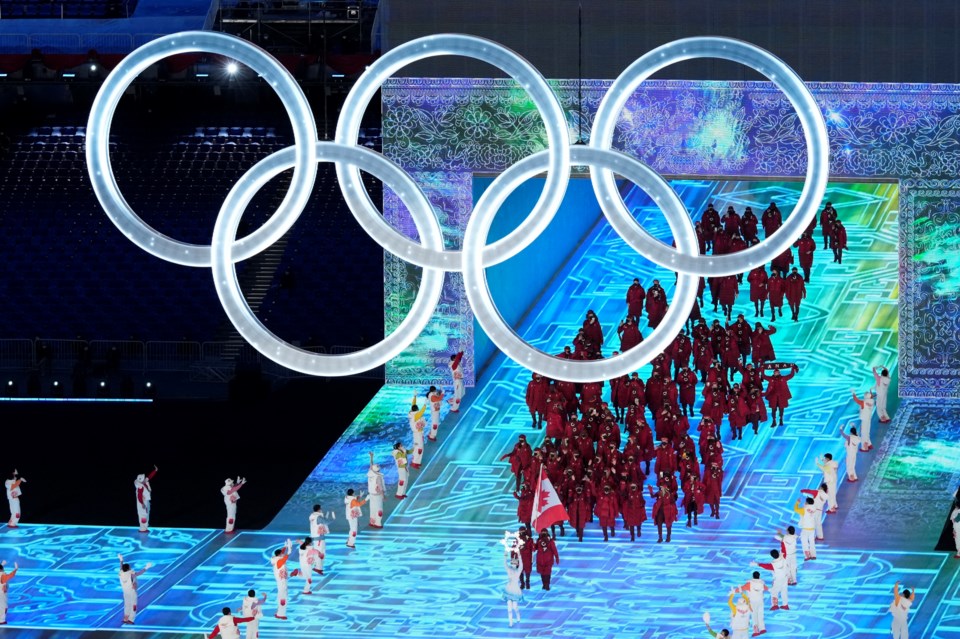BRAMPTON, Ont. — Ratings are like Winter Olympic athletes. They can go downhill, soar or go sideways; they can crash and get spun. On top of all that, they're not always easy to judge.
Early returns for these 2022 Winter Olympic Games find broadcasters in Canada and the United States playing catch up with past expectations, while navigating an unusually high number of moguls.
Fact is, in the four years since the last Winter Games, the traditional broadcast network share of viewership has declined dramatically. It should come as no surprise then, that ratings for the first weekend of the 2022 Beijing Olympics reveal a 25 per cent drop in Canadian viewers from the last Winter Games, with an even steeper decline in NBC's American viewership.
According to Numeris, an average minute audience of 943,000 Canadians watched CBC's rebroadcast of the opening ceremonies, with another 788,000 getting up early across Canada to watch the presentation live.
That's down 25 per cent compared to the Winter Games four years ago from Pyeongchang, which faced the same time zone hurdles of the Beijing Games.
Both the live and encore broadcasts were down six per cent compared to the Summer Games from Tokyo just six months ago.
CBC has shared coverage with CBC News Network as well as TSN and Sportsnet. Viewers can also stream the Games on CBC Gem and other digital platforms.
Canadian wins over the weekend and since have helped spike the broadcaster's numbers.
Numeris reported audience levels for the Canada-USA women's hockey game peaked at 1.3 million viewers watching live at 12:10 am ET early Tuesday morning.
On both Day 1 and 2, CBC was the most-watched English network in Canada in prime time (7 p.m. to 12 a.m.) among audiences ages 25 to 54, averaging more than one million viewers both evenings. Numbers spiked whenever Canada was in contention. On Saturday, a peak audience of 1.5 million viewers watched the women's snowboard slopestyle; on Sunday, the same high was reached during the pairs figure skating competition.
In addition, on Saturday, the number of viewers streaming the Games on CBC Gem was up 60 per cent compared to Day 1 in Tokyo, according to Adobe Analytics.
In the United States, Nielsen TV ratings reveal NBC drew 8.7 million viewers on Friday for their re-broadcast of the opening ceremonies in prime time. While, proportionally that's not that far off the CBC Friday night prime time total, it is a historic low and a drop of 43 per cent, according to Nielsen, from the Pyeongchang Games in 2018.
Why such a drop? The 13-hour time zone variance is similar to that seen in Pyeongchang, and viewers have been trained for years to expect live events happening in early morning hours or other dayparts. Broadcasters have long presented a prime time Olympic strategy that assumes many viewers will watch whether or not — or maybe because — they already know what has happened.
Still, there are several factors that could explain the varying levels of interest in each country:
1. The pandemic. Extraordinary COVID-19 precautions that ban most in-person spectators and keep locals from greeting the Olympic stars drain much of the typical vigour of live sporting broadcasts. On top of that, viewers sick of wearing masks for two years might not want to see their Olympic heroes strap them on after events, or in some cases, wear them while they are playing.
2. The early results. Three days into the Games, the United States found itself 17th place in Olympic medal standings. That started to creep up Wednesday morning when the U.S. snagged its first gold medal, in women's snowboard cross, bringing its overall tally to seven. Canada stood at eight medals, including one gold.
3. Geo-political headwinds: Tensions have been high between China and Canada since the arrest of telecom executive Meng Wanzhou in Â鶹´«Ã½Ó³»led to the detention of Canadians Michael Spavor and Michael Kovrig in China. Audiences on both sides of the border have also been exposed to the steady rants of former U.S. president Donald Trump, who has blamed China for the COVID-19 pandemic.
NBC's coverage of the Games, especially during the opening ceremonies, have largely set things up as a clash between two superpowers: the United States and China.
Early that first morning, Olympic host Mike Tirico introduced two pundits hired to put Beijing in context: Andrew Browne, an editorial director at Bloomberg, and Jing Tsu, a Yale professor specializing in Asian studies. The hard news angle led to much talk of China's human rights violations. While Browne and Tsu reported that U.S. charges of "cultural genocide" have been denied as the "lie of the century" by the Chinese, they said it repeatedly. Both commentators have been hired to appear throughout the duration of NBC's coverage.
By the time the actual ceremony commenced — with China's president Xi Jinping and Russian leader Vladimir Putin in the stands and Canadian and U.S. representatives boycotting at home — American viewers may had already reached for the remote.
CBC's coverage has not turned a blind eye to the elephant in the room. CBC News anchor Adrienne Arsenault is in Beijing filing reports on the clampdown in freedoms. Other strange moments have snuck through the cracks. Viewers saw a Canadian-born member of China's women's hockey team, goaltender Zhou Jiaying, struggle to answer questions in Mandarin. When the reporter asked if she would answer in English, an aide stepped in and said, "she's not allowed."
Overall, however, the Canadian coverage seems more focused on these Games as an opportunity to provide a welcome distraction from unsettling times, headlines and horn honking.
Hard news and broader TV viewer erosion have shaken these Olympics but a celebration is still what many Canadians want to watch right now.
— Bill Brioux is a freelance TV columnist based in Brampton, Ont.
This report by The Canadian Press was first published Feb. 9, 2022.
Bill Brioux, The Canadian Press

